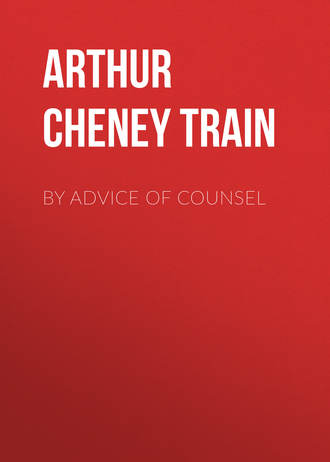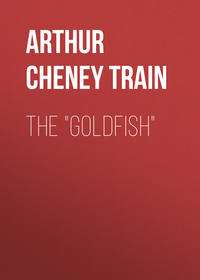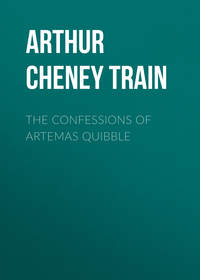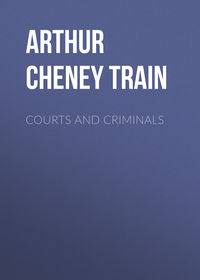 полная версия
полная версияBy Advice of Counsel
His methods were no more complicated than his aims and had weathered the test of generations of experience. So:
"Of course Tony must be bailed out," he said gently. "You don't want him to spend the night in jail."
"Jail! Oh, no! How much is the bail?" cried Tony's mother.
"Only five hundred dollars." His pale gray eyes were watching her for the slightest sign of suspicion.
"Five hundred dollars! Eoi! Eoi! It is a fortune! Where can I get five hundred dollars?" She burst into tears. "I have saved only one hundred and sixty!"
Mr. Simpkins pursed his lips. Then there was nothing for it! He reached for his hat. Mrs. Mathusek wrung her hands. Couldn't the gentleman go bail for Tony? He was such a dear, kind, good gentleman! She searched his face hungrily. Mr. Simpkins falteringly admitted that he did not possess five hundred dollars.
"But—" he hesitated.
"Yes!"
"But—" she echoed, seizing his sleeve and dragging him back.
Mr. Simpkins thought that they could hire somebody to go bail; no, in that case there would be no money to pay the great lawyer whom they must at once engage to defend her son—Mr. Hogan, one who had the pull and called all the judges by their first names. He would not usually go into court for less than five hundred dollars, but Mr. Simpkins said he would explain the circumstances to him and could almost promise Mrs. Mathusek that he would persuade him to do it this once for one hundred and fifty. So well did he act his part that Tony's mother had to force him to take the money, which she unsewed from inside the ticking of her mattress. Then he conducted her to the station house to show her how comfortable Tony really was and how much better it was to let him stay in jail one night and make sure of his being turned out the next afternoon by giving the money to Mr. Hogan, than to use it for getting bail for him and leave him lawyerless and at the mercy of his accusers. When Mrs. Mathusek saw the cell Tony was in she became even more frightened than she had been at first. But by that time she had already given the money to Simpkins.
Second thoughts are ofttimes best. Most crooks are eventually caught through their having, from long immunity, grown careless and yielded to impulse. Once he had signed the complaint in which he swore that he had seen Tony throw the brick, Delany had undergone a change of heart. Being an experienced policeman he was sensitive to official atmosphere, and he had developed a hunch that Judge Harrison was leery of the case. The more he thought of it the less he liked the way the son-of-a-gun had acted, the way he'd tried to get Mathusek to ask for an immediate hearing. Why had he ever been such a fool as to sign the complaint himself? It had been ridiculous—just because he was mad at the boy for trying to get away and wanted to make things easy for Froelich. If he went on the stand the next afternoon he'd have to make up all sorts of fancy details, and Hogan would have his skin neatly tacked to the barn doors for keeps. Thereafter, no matter what happened, he'd never be able to change his testimony. After all, it would be easy enough to abandon the charge at the present point. It was a genuine case of cold feet. He scented trouble. He wanted to renig while the renigging was good. What in hell had Froelich ever done for him, anyhow? A few measly pieces of roast!
When Hogan returned home that evening with the little Hogans from the movies he found the cop waiting for him outside his door.
"Look here," Delany whispered, "I'm going to can this here Mathusek window case. I'm going to fall down flat on my identification and give you a walkout. So go easy on me—and sort of help me along, see?"
"The hell you are!" retorted Hogan indignantly. "Then where do I come in, eh? Why don't you come through?"
"But I've got him wrong!" pleaded Delany. "You don't want me to put my neck in a sling, do you, so as you can make a few dollars? Look at all the money I've sent your way. Have a heart, Rafe!"
"Bull!" sneered the Honorable Rafe. "A man's gotta live! You saw him do it! You've sworn to it, haven't you?"
"I made a mistake."
"How'll that sound to the commissioner? An' to Judge Harrison? No, no! Nothin' doin'! If you start anything like that I'll roast the life out of you!"
Delany spat as near Hogan's foot as he elegantly could.
"You're a hell of a feller, you are!" he growled, and turned his back on him as upon Satan.
The brick that Terry McGurk hurled as a matter of principle through Froelich's window produced almost as momentous consequences as the want of the horseshoe nail did in Franklin's famous maxim. It is the unknown element in every transaction that makes for danger.
The morning after the catastrophe Mr. Froelich promptly made application to the casualty company with which he had insured his window for reimbursement for his damage. Just as promptly the company's lawyer appeared at the butcher shop and ascertained that the miscreant who had done the foul deed had been arrested and was to be brought into court that afternoon. This lawyer, whose salary depended indirectly upon the success which attended his efforts to secure the conviction and punishment of those who had cost his company money, immediately camped upon the trails of both Froelich and Delany. It was up to them, he said, to have the doer of wanton mischief sent away. If they didn't cooperate he would most certainly ascertain why. Now insurance companies are powerful corporations. They can do favors, and contrariwise they can make trouble, and Lawyer Asche was hot under the collar about that window. Had he ever heard of the place he would have likened it to the destruction of Coucy-le-Château by the Huns.
This, for Delany, put an entirely new aspect upon the affair. It was one thing to ditch a case and another to run up against Nathan Asche. He had sworn to the complaint and if he didn't make good on the witness stand Asche would get his hide. Then he bethought him that if only Froelich was sufficiently emphatic in his testimony a little uncertainty on his own part might be excused.
In the meantime, however, two things had happened to curdle Froelich's enthusiasm. First, his claim against the Tornado Casualty Company had been approved, and second, he had been informed on credible authority that they had got the wrong boy. Now he had sincerely thought that he had seen Tony throw the brick—he had certainly seen a boy in a red sweater do something—but he realized also that he had been excited and more or less bewildered at the time; and his informant—Mrs. Sussman, the wife of the cigar dealer—alleged positively that it had been thrown by a strange kid who appeared suddenly from round the corner and as suddenly ran away in the direction whence he had come.
Froelich perceived that he had probably been mistaken, and being relatively honest—and being also about to get his money—and not wishing to bear false witness, particularly if he might later be sued for false imprisonment, he decided to duck and pass the buck to Delany, who was definitely committed. He was shrewd enough, however, not to give his real reason to the policeman, but put it on the ground of being so confused that he couldn't remember. This left Delany responsible for everything.
"But you said that that was the feller!" argued the cop, who had gone to urge Froelich to assume the onus of the charge. "And now you want to leave me holdin' the bag!"
"Vell, you said yourself you seen him, didn't you?" replied the German. "An' you svore to it. I didn't svear to noddings."
"Aw, you!" roared the enraged cop, and hastened to interview Mr. Asche.
Aping a broad humanitarianism he suggested to Asche that if Mrs. Mathusek would pay for the window they could afford to let up on the boy. He did it so ingeniously that he got Asche to go round there, only to find that she had no money, all given to Simpkins. Gee, what a mix-up!
It is quite possible that even under these circumstances Delany might still have availed himself of what in law is called a locus poenitentiae had it not been that the mix-up was rendered still more mixed by the surreptitious appearance in the case of Mr. Michael McGurk, the father of the actual brick artist, who had learned that the cop was getting wabbly and was entertaining the preposterous possibility of withdrawing the charge against the innocent Mathusek, to the imminent danger of his own offspring. In no uncertain terms the saloon keeper intimated to the now embarrassed guardian of the public peace that if he pulled anything like that he would have him thrown off the force, to say nothing of other and darker possibilities connected with the morgue. All of which gave Delany decided pause.
Hogan, for his own reasons, had meanwhile reached an independent conclusion as to how he could circumvent Delany's contemplated treachery. If, he decided, the cop should go back on his identification of the criminal he foresaw Tony's discharge in the magistrate's court, and no more money. The only sure way, therefore, to prevent Tony's escape would be by not giving Delany the chance to change his testimony; and by waiving examination before the magistrate and consenting voluntarily to having his client held for the action of the grand jury, in which event Tony would be sent to the Tombs and there would be plenty of time for Simpkins to get an assignment of Mrs. Mathusek's insurance money before the grand jury kicked out the case. This also had the additional advantage of preventing any funny business on the part of Judge Harrison.
Delany was still undecided what he was going to do when the case was called at two o'clock. It is conceivable that he might still have tried to rectify his error by telling something near the truth, in spite of Hogan, Asche and McGurk, but the opportunity was denied him.
At two o'clock Tony, a mere chip tossed aimlessly hither and yon by eddies and cross currents, the only person in this melodrama of motive whose interests were not being considered by anybody, was arraigned at the bar and, without being consulted in the matter, heard Mr. Hogan, the fat, kindly lawyer whom his mother had retained to defend him, tell the judge that they were going to waive examination and consent to be held for the action of the grand jury.
"You see how it is, judge," Hogan simpered. "You'd have no choice but to hold my client on the officer's testimony. The easiest way is to waive examination and let the grand jury throw the case out of the window!"
Delany heard this announcement with intense relief, for it let him out. It would relieve him from the dangerous necessity of testifying before Judge Harrison and he could later spill the case before the grand jury when called before that august body. Moreover, he could tip off the district attorney in charge of the indictment bureau that the case was a lemon, and the latter would probably throw it out on his own motion. The D.A.'s office didn't want any more rotten cases to prosecute than it could help. It seemed his one best bet, the only way to get his feet out of the flypaper. What a mess for a few pieces of rotten beef!
"You understand what is being done, do you?" inquired the keen-faced judge sharply. "You understand this means that unless you give bail you will have to stay in jail until the grand jury dismisses the case or finds an indictment against you?"
Underneath the cornice of the judge's dais Hogan patted his arm, and Tony, glancing for encouragement at the big friendly face above him, whispered "Yes."
So Tony went to the Tombs and was lodged in a cell next door to Soko the Monk, who had nearly beaten a Chinaman to death with a pair of brass knuckles, from whom he learned much that was exciting if not edifying.
Now, as Delany was wont to say for years thereafter, that damn Mathusek case just went bad on him. He had believed that in the comparative secrecy of the inquisitorial chamber he could easily pretend that he had originally made an honest mistake and was no longer positive of the defendant's identity, in which case when the grand jury threw out the case nobody would ever know the reason and no chickens would come home to roost on him.
But when the cop visited the office of Deputy Assistant District Attorney Caput Magnus the next morning, to inform him that this here window-breaking case was a Messina, he found Mr. Nathan Asche already solidly there present, engaged in advising Mr. Magnus most emphatically to the exact contrary. Indeed the attorney was rhetorical in his insistence that this destruction of the property of law-abiding taxpayers must stop.
Mr. Asche was not a party to be trifled with. He was a rectangular person whom nothing could budge, and his very rectangularity bespoke his stubborn rectitude. His shoulders were massive and square, his chin and mouth were square, his burnsides were square cut, and he had a square head and wore a square-topped derby. He looked like the family portrait of Uncle Amos Hardscrabble. When he sat down he remained until he had said his say. It was a misfortunate meeting for Delany, for Asche nailed him upon the spot and made him repeat to Caput Magnus the story of how he had seen Tony throw the brick and then, for some fool reason, not being satisfied to let it go at that, he insisted on calling in a stenographer and having Delany swear to the yarn in affidavit form! This entirely spoiled any chance the policeman might otherwise have had of changing his testimony. He now had no choice but to go on and swear the case through before the grand jury—which he did.
Even so, that distinguished body of twenty-three representative citizens was not disposed to take the matter very seriously. Having heard what Delany had to say—and he made it good and strong under the circumstances—several of them remarked disgustedly that they did not understand why the district attorney saw fit to waste their valuable time with trivial cases of that sort. Boys would play ball and boys would throw balls round; if not balls, then stones. They were about to dismiss by an almost unanimous vote, when the case went bad again. The foreman, a distinguished person in braided broadcloth, rose and announced that he was very much interested to learn their views upon this subject as he was the president of a casualty company, and he wished them to understand that thousands—if not hundreds of thousands—of dollars' worth of plate-glass windows were wantonly broken by young toughs, every year, for which his and other insurance companies had to recoup the owners. In fact, he alleged heatedly, window breaking was a sign of peculiar viciousness. Incipient criminals usually started their infamous careers that way; you could read that in any book on penology. An example ought to be made. He'd bet this feller who threw the brick was a gangster.
So his twenty-two fellow grand jurymen politely permitted him to recall Officer Delany and ask him: "Say, officer, isn't it a fact—just tell us frankly now—if this feller Mathusek isn't a gangster?"
"Sure, he's a gangster. He was blowin' about it to me after I arrested him," swore Delany without hesitation.
The foreman swept the circle with a triumphant eye.
"What'd I tell you?" he demanded. "All in favor of indicting said Tony Mathusek for malicious destruction of property signify in the usual manner. Cont'riminded? It's a vote. Ring the bell, Simmons, and bring on the next case."
So Tony was indicted by the People of the State of New York for a felony, and a learned judge of the General Sessions set his bail at fifteen hundred dollars; and Hogan had his victim where he wanted him and where he could keep him until he had bled his mother white of all she had or might ever hope to have in this world.
Everybody was satisfied—Hogan, Simpkins, Asche, McGurk, even Delany, because the fleas upon his back were satisfied and he was planning ultimately to get rid of the whole damn tangle by having the indictment quietly dismissed when nobody was looking, by his friend O'Brien, to whom the case had been sent for trial. And everything being as it should be, and Tony being locked safely up in a cell, Mr. Joey Simpkins set himself to the task of extorting three hundred and fifty dollars more from Mrs. Mathusek upon the plea that the great Mr. Hogan could not possibly conduct the case before a jury for less.
Now the relations of Mr. Assistant District Attorney O'Brien and the Hon. Raphael B. Hogan were distinctly friendly. At any rate, whenever Mr. Hogan asked for an adjournment in Mr. O'Brien's court he usually got it without conspicuous difficulty, and that is what occurred on the five several occasions that the case of The People versus Antonio Mathusek came up on the trial calendar during the month following Tony's incarceration, on each of which Mr. Hogan with unctuous suavity rose and humbly requested that the case be put over at his client's earnest request in order that counsel might have adequate time in which to subpoena witnesses and prepare for a defense.
And each day Simpkins, who now assumed a threatening and fearsome demeanor toward Mrs. Mathusek, visited the heartsick woman in her flat and told her that Tony could and would rot in the Tombs until such time as she procured three hundred and fifty dollars. The first week she assigned her life-insurance money; the second she pawned the furniture; until at last she owed Hogan only sixty-five dollars. At intervals Hogan told Tony that he was trying to force the district attorney to try the case, but that the latter was insisting on delay.
In point of fact, O'Brien had never looked at the papers, much less made any effort to prepare the case; if he had he would have found that there was no case at all. And Delany's mind became at peace because he perceived that at the proper psychological moment he could go to O'Brien and whisper: "Say, Mr. O'Brien, that Mathusek case. It's a turn-out! Better recommend it for dismissal," and O'Brien would do so for the simple reason that he never did any more work than he was actually compelled to do.
But as chance would have it, three times out of the five, Mr. Ephraim Tutt happened to be in court when Mr. Hogan rose and made his request for an adjournment; and he remembered it because the offense charged was such an odd one—breaking a window.
Delany's simple plan was again defeated by Nemesis, who pursued him in the shape of the rectangular Mr. Asche, and who shouldered himself into O'Brien's office during the fifth week of Tony's imprisonment and wanted to know why in hell he didn't try that Mathusek case and get rid of it. The assistant district attorney had just been called down by his official boss and being still sore was glad of a chance to take it out on someone else.
"D'you think I've nothin' better to do than try your damned old window-busting cases?" he sneered. "Who ever had the idea of indicting a boy for that sort of thing, anyhow?"
"That is no way to talk," answered Mr. Asche with firmness. "You're paid to prosecute whatever cases are sent to you. This is one of 'em. There's been too much delay. Our president will be annoyed."
"Oh, he will, will he?" retorted O'Brien, nevertheless, coming to the instant decision that he had best find some other excuse than mere disinclination. "If he gets too shirty I'll tell him the case came in here without any preparation and being in the nature of a private prosecution we've been waiting for you to earn your fee. How'll you like that, eh?"
Mr. Asche became discolored.
"H'm!" he replied softly. "So that is it, is it? You won't have that excuse very long, even if you could get away with it now. I'll have a trial brief and affidavits from all the witnesses ready for you in forty-eight hours."
"All right, old top!" nodded O'Brien carelessly. "We always strive to please!"
So Mr. Asche got busy, while the very same day Mr. Hogan asked for and obtained another adjournment.
Some people resemble animals; others have a geometrical aspect. In each class the similarity tends to indicate character. The fox-faced man is apt to be sly, the triangular man is likely to be a lump. So Mr. Asche, being rectilinear, was on the square; just as Mr. Hogan, being soft and round, was slippery and hard to hold. Three days passed, during which Mrs. Mathusek grew haggard and desperate. She was saving at the rate of two dollars a day, and at that rate she would be able to buy Tony a trial in five weeks more. She had exhausted her possibilities as a borrower. The indictment slept in O'Brien's tin file. Nobody but Tony, his mother and Hogan remembered that there was any such case, except Mr. Asche, who one afternoon appeared unexpectedly in the offices of Tutt & Tutt, the senior partner of which celebrated law firm happened to be advisory counsel to the Tornado Casualty Company.
"I just want you to look at these papers, Mr. Tutt," Mr. Asche said, and his jaw looked squarer than ever.
Mr. Tutt was reclining as usual in his swivel chair, his feet crossed upon the top of his ancient mahogany desk.
"Take a stog!" he remarked without getting up, and indicating with the toe of one Congress-booted foot the box which lay open adjacent to the Code of Criminal Procedure. "What's your misery?"
"Hell's at work!" returned Mr. Asche, solemnly handing over a sheaf of affidavits. "I never smoke."
Mr. Tutt somewhat reluctantly altered his position from the horizontal to the vertical and reached for a fresh stogy. Then his eye caught the name of Raphael B. Hogan.
"What the devil is this?" he cried.
"It's the devil himself!" answered Mr. Asche with sudden vehemence.
"Tutt, Tutt! Come in here!" shouted the head of the firm. "Mine enemy hath been delivered into mine hands!"
"Hey? What?" inquired Tutt, popping across the threshold. "Who—I mean—"
"Raphael B. Hogan!"
"The devil!" ejaculated Tutt.
"You've said it!" declared Mr. Asche devoutly.
That evening under cover of darkness Mr. Ephraim Tutt descended from a dilapidated taxi at the corner adjacent to Froelich's butcher shop, and several hours later was whisked uptown again to the brownstone dwelling occupied by the Hon. Simeon Watkins, the venerable white-haired judge then presiding in Part I of the General Sessions, where he remained until what may be described either as a very late or a very early hour, and where during the final period of his intercourse he and that distinguished member of the judiciary emptied an ancient bottle containing a sparkling rose-colored liquid of great artistic beauty.
Then Mr. Tutt returned to his own library at the house on Twenty-third Street and paced up and down before the antiquated open grate, inhaling quantities of what Mr. Bonnie Doon irreverently called "hay smoke," and pondering deeply upon the evils that men do to one another, until the dawn peered through the windows and he bethought him of the all-night lunch stand round the corner on Tenth Avenue, and there sought refreshment.
"Salvatore," he remarked to the smiling son of the olive groves who tended that bar of innocence, "the worst crook in the world is the man who does evil for mere money."
"Si, Signor Tutti," answered Salvatore with Latin perspicacity. "You gotta one, eh? You giva him hell?"
"Si! Si!" replied Mr. Tutt cheerily. "Even so! And of a truth, moreover! Give me another hot dog and a cup of bilge water!"
"People versus Mathusek?" inquired Judge Watkins some hours later on the call of the calendar, looking quite vaguely as if he had never heard of the case before, round Part I, which was as usual crowded, hot, stuffy and smelling of unwashed linen and prisoners' lunch. "People versus Mathusek? What do you want done with this case, Mr. O'Brien?"
"Ready!" chanted the red-headed O'Brien, and, just as he had expected, the Hon. Raphael Hogan limbered up in his slow, genial way and said: "If Your Honor please, the defendant would like a few days longer to get his witnesses. Will Your Honor kindly adjourn the case for one week?"
He did not notice that the stenographer was taking down everything that he said.
"I observe," remarked Judge Watkins with apparent amiability, "that you have had five adjournments already. If The People's witnesses are here I am inclined to direct you to proceed. The defendant has been under indictment for six weeks. That ought to be long enough to prepare your defense."
"But, Your Honor," returned Hogan with pathos, "the witnesses are very hard to find. They are working people. I have spent whole evenings chasing after them. Moreover, the defendant is perfectly satisfied to have the case go over. He is anxious for an adjournment!"





